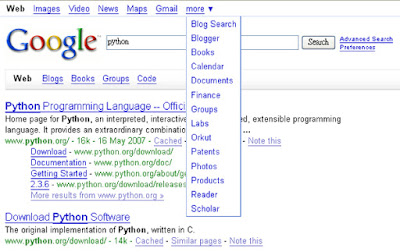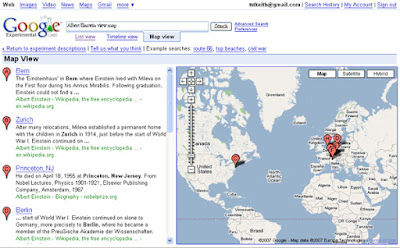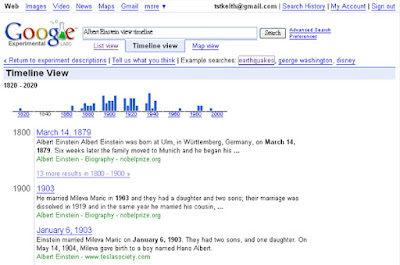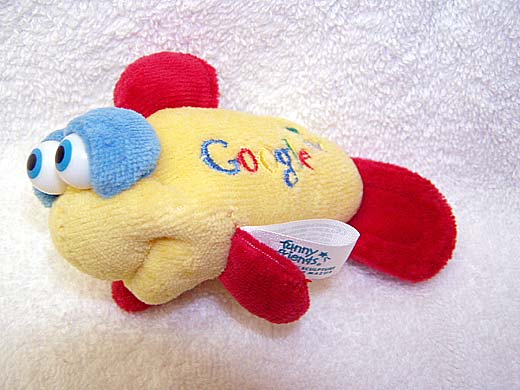 Today is a big day for Google with all the exciting announcements that further enhances the core of Google's great empire - search. From day one, Google aimed themselves to become the universal search engine that ultimately search across all its content sources, compare and rank all the information in real time, and deliver a single, integrated set of search results that offers users precisely what they are looking for. Beginning today, Google will incorporate information from a variety of previously separate sources – including videos, images, news, maps, books, and websites – into a single set of results.
Today is a big day for Google with all the exciting announcements that further enhances the core of Google's great empire - search. From day one, Google aimed themselves to become the universal search engine that ultimately search across all its content sources, compare and rank all the information in real time, and deliver a single, integrated set of search results that offers users precisely what they are looking for. Beginning today, Google will incorporate information from a variety of previously separate sources – including videos, images, news, maps, books, and websites – into a single set of results.
"At first, universal search results may be subtle. Over time users will recognize additional types of content integrated into their search results as the company advances toward delivering a truly comprehensive search experience."
- Google Press Release
Here are the three major upgrades:
The Power of Google Technology
Google has begin their first stage of an upgraded ranking mechanism (PageRank) that automatically and objectively compares different types of information. As always, Google search results are ranked automatically by algorithms to deliver the best results to users anywhere in the world. Most of this innovation addresses basic ranking algorithms and is often not obvious to users. Users just see more accurate results, more often, in more languages, which is our primary goal.
New Navigation Features
New dynamically generated navigation links have been added above the search results to suggest additional information that is relevant to a user's query. For example, a search for "python" will now generate links to Blog Search, Book Search, Groups, and Code, to let the user know there is additional information on his or her query in each of those areas. As a result, users can find a wider array of information on their topic, including data types they might not have initially considered.

Google's homepage and a number of applications (e.g. Gmail and Picasa Web Album, etc.) have also been updated with a new navigation bar on the top of the screen to provide easier access to popular Google products. Now, instead of having links above the Google.com homepage search box, users will see a navigation bar on the top left side of the page with various Google search properties and popular products including Gmail, Google Calendar, Docs & Spreadsheets, and Picasa Web Albums.

Experience the Experiments
Google also announced today a new experimental version of its popular search service called Google Experimental, available on Google Labs. This new test site provides users an opportunity to try out some of the latest search experiments and innovations and provide Google with feedback. One of the first experiments to be featured on the site enables users to view their search results on a map or timeline. For instance, when someone searches for "Albert Einstein" on Google Experimental, they can choose to view the search results on a map that shows locations mentioned within web pages about Albert Einstein or on a timeline that illustrates the history of Albert Einstein's life.


 For those who have been waiting so long for Google Reader to go offline, Google has finally found a solution they name as Google Gears. The open source browser extension enables web applications to provide offline functionality using following JavaScript APIs. Here are its functionalities:
For those who have been waiting so long for Google Reader to go offline, Google has finally found a solution they name as Google Gears. The open source browser extension enables web applications to provide offline functionality using following JavaScript APIs. Here are its functionalities:
 To start reading your feed offline, simply click the "Offline" link in the top right of Google Reader. As predicted by Haochi from Googlified, Google Gears is expected to be integrated with Gmail, Google Docs and Spreadsheet, Google Notebook and thousands of other web applications (not necessarily hosted by Google) that stores users' data.
To start reading your feed offline, simply click the "Offline" link in the top right of Google Reader. As predicted by Haochi from Googlified, Google Gears is expected to be integrated with Gmail, Google Docs and Spreadsheet, Google Notebook and thousands of other web applications (not necessarily hosted by Google) that stores users' data.
 Google announced in the
Google announced in the 
 To get an idea of what this is all about, you can visit
To get an idea of what this is all about, you can visit  Now, Google Maps gives you a new way to explore the virtual maps: street level view. Currently in Denver, Las Vegas, Miami, New York, and San Francisco, you'll find a button that says "Street View". Once you click on that button, watch the street marked with blue lines and click on one of them to see a street view for that location. To navigate along the street, click on the white arrows or use the arrow keys. You can also rotate the image and see a complete a panoramic view.
Now, Google Maps gives you a new way to explore the virtual maps: street level view. Currently in Denver, Las Vegas, Miami, New York, and San Francisco, you'll find a button that says "Street View". Once you click on that button, watch the street marked with blue lines and click on one of them to see a street view for that location. To navigate along the street, click on the white arrows or use the arrow keys. You can also rotate the image and see a complete a panoramic view.
 If you thought that the textual instructions aren't descriptive enough, Google has a made a video and uploaded it to YouTube:
If you thought that the textual instructions aren't descriptive enough, Google has a made a video and uploaded it to YouTube:


 , animated yellow square smileys
, animated yellow square smileys  and static black & white smileys
and static black & white smileys .
.


 Try it yourself. Enter keywords below:
Try it yourself. Enter keywords below:



 This feature might actually been hinted by the General Manager of Google’s Enterprise division, Dave Girouard, in an interview with internetnews.com back in December:
This feature might actually been hinted by the General Manager of Google’s Enterprise division, Dave Girouard, in an interview with internetnews.com back in December:
























